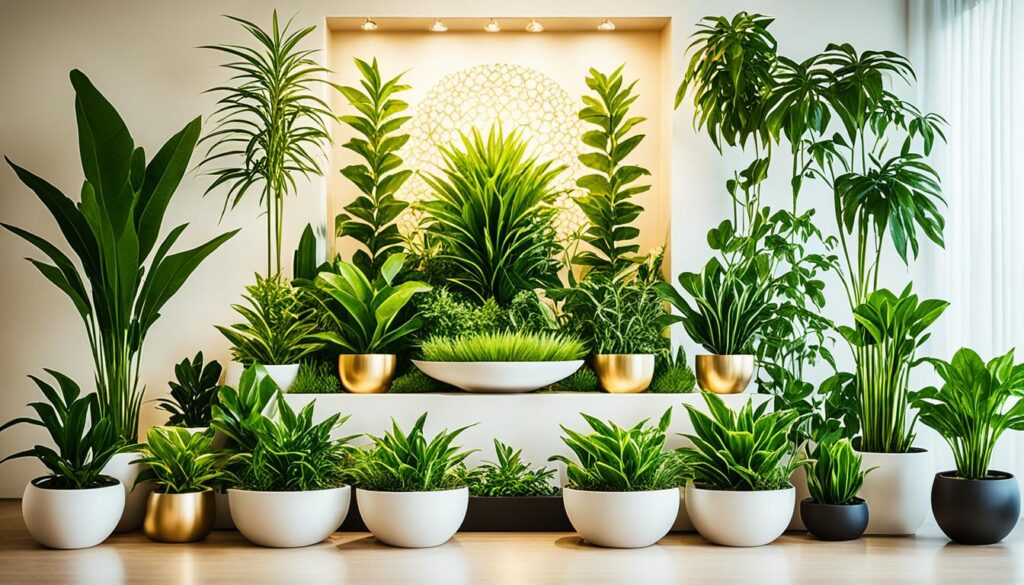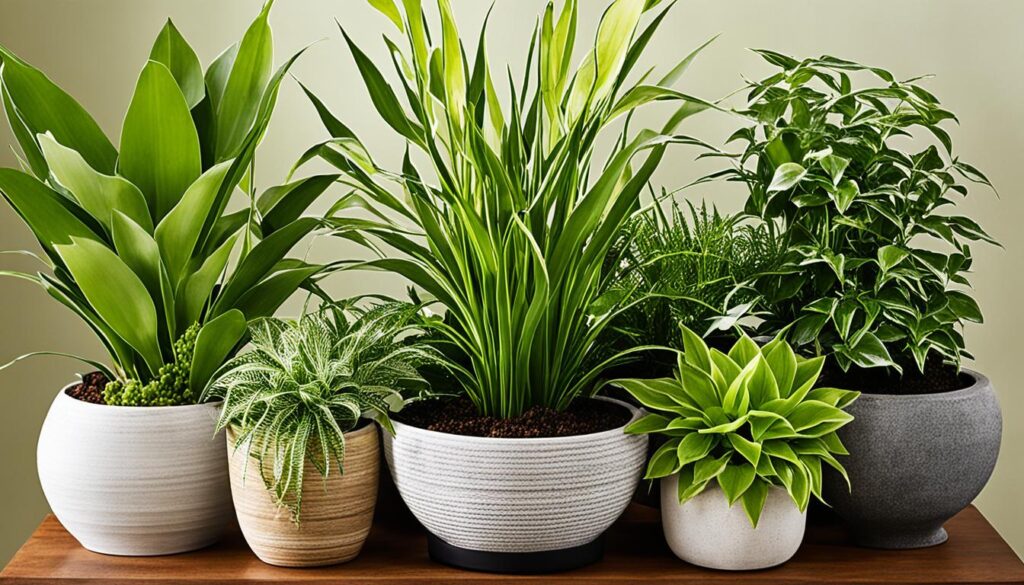I’ve always been drawn to how nature can change spaces for the better. Learning about feng shui plants was like discovering a secret way to bring more positivity into our lives. These plants are more than just pretty; they boost energy, lift moods, and even attract luck!
Feng shui plants help bring positive energy into our homes and offices. They are linked to the wood element, which supports growth and flexibility. I find it amazing how they help balance our inner and outer energies, making our spaces more harmonious.
On my feng shui journey, I’ve found that plants with soft, rounded leaves are very effective. The money tree is a favorite, believed to bring wealth and luck1. It’s incredible how a simple plant can carry such deep meaning.
Chinese garden plants like bamboo are key in feng shui. Lucky bamboo can grow up to 5 feet tall2. Each stalk of bamboo has its own meaning, adding depth to this powerful plant.
The jade plant, or money plant, is another favorite of mine. Its leaves resemble coins and are thought to attract wealth1. It’s a tough plant that’s easy to care for, great for beginners in gardening and feng shui.
But it’s not all about money and luck. Feng shui plants also clean our air and support health. The snake plant, for example, makes oxygen at night, keeping our spaces clean while we sleep1. It’s like having a natural air purifier working for us!
Key Takeaways
- Feng shui plants bring positive energy into spaces
- They represent the wood element, promoting growth and flexibility
- Soft, rounded leaves are preferred in feng shui
- Money trees and jade plants are believed to attract wealth
- Some plants, like snake plants, purify air and promote health
- Proper placement enhances the flow of positive energy
- Care and maintenance are crucial for optimal feng shui benefits
Introduction to Feng Shui and Plants
Feng shui is an ancient Chinese practice that aims to balance our living spaces with nature’s energy. Adding plants to our homes can greatly improve this balance. Let’s dive into the world of feng shui and see how plants are key to this tradition.
What is Feng Shui?
Feng shui is an ancient Chinese method of arranging spaces to improve energy flow. It believes our surroundings impact our well-being. By using feng shui, we can make spaces that help us reach our goals and live better.
The Role of Plants in Feng Shui
Plants are essential in feng shui. They stand for the wood element, which means growth and energy. Green plants increase wood energy, which is linked to health and family. This energy boosts vitality and growth in feng shui3.
Benefits of Incorporating Plants in Your Space
Adding plants to your home has many benefits. They clean the air, lower stress, and make us feel better. In feng shui, certain plants draw in certain energies. For instance, jade plants bring wealth and good luck4.
Choosing the right plants for your home is important. Plants like jade, money trees, and areca palms help with money flow in feng shui3. By placing plants wisely, we can make our homes balanced and supportive of our goals and well-being.
Understanding the Wood Element in Feng Shui
In feng shui, the wood element is key for balance and harmony. It stands for wealth, family, health, and prosperity. This makes it vital in any space5. Learning more about this ancient practice shows me that wood links to spring, growth, and creativity6.
Wood’s colors are blue, green, and brown5. Using these colors in garden plants and decor boosts the wood energy. Live plants and fresh flowers are great for adding wood energy6.
For wooden furniture, arranging it in a U-shape helps with energy flow and conversation5. Furniture like oak, pine, bamboo, or wicker brings wood into your home6.
The Bagua Map shows wood in the east and southeast6. Adding wood here can boost financial success5. Feng shui links wood to health issues like liver, feet, arms, and nerves6.
Balance is crucial in feng shui. Wood must blend with water, metal, fire, and earth for a balanced space6.
Best Feng Shui Plants for Different Areas of Your Home
Choosing the right garden plants for each room can boost your home’s energy flow. Let’s look at some great options for different spaces in your house.
Living Room Plants
In the living room, I prefer plants that spread positive energy. The Money Tree Plant, or Pachira Aquatica, is a top pick. It’s said to draw in luck and fortune7. Philodendron is another great pick. It’s simple to care for and stands for the fire element, helping to balance emotions at home7.
Bedroom Plants
For bedrooms, I suggest plants that help with sleep and relaxation. The Snake Plant is an excellent choice. It’s thought to bring good fortune and clean the air7. Peace Lilies are also great. They turn bad energy into positive vibes, making your bedroom peaceful7.
Kitchen Plants
In the kitchen, herbs are a great pick. They boost the area’s energy and add fresh taste to your cooking. Citrus trees, even if they don’t produce fruit indoors, are seen as lucky in feng shui7. The Rubber Plant is another top choice for the kitchen. It’s believed to draw in fortune and wealth, and it does well with regular watering7.
Office Plants
For offices, pick plants that bring in prosperity and success. The Jade Plant is linked with luck, wealth, and success in feng shui. It needs strong sunlight for at least six hours a day7. Lucky Bamboo is another top pick. It brings a calm and focused vibe, ideal for work7.
Adding these feng shui plants can refresh your spaces and bring in the wood element to your home8. By selecting the right plants for each area, you’re not just decorating. You’re creating a balanced environment that supports your health and success.
Plants That Attract Wealth and Prosperity

In Chinese feng shui, certain plants are believed to bring wealth and prosperity. Adding these plants to your space can improve the energy flow. Let’s look at some top plants for attracting wealth.
The money tree, or Pachira aquatica, is a top pick. It has a braided trunk and leaves shaped like coins, symbolizing financial growth. Putting it in the southeast corner of your home or office can increase wealth energy9.
Jade plants are also favored in feng shui. They have plump, oval leaves that stand for growth and renewal. For the best effect, place your jade plant near the entrance or in the southeast of a room9.
Lucky bamboo is a well-known feng shui plant. Its straight stalks symbolize strength and flexibility. The number of stalks has different meanings:
- 2 stalks for love and relationship harmony
- 3 stalks for happiness, wealth, and longevity
- 5 stalks for overall health and well-being
- 7 stalks for good health
- 8 stalks for growth and prosperity
- 9 stalks for general good fortune
Golden pothos, a type of money plant, is great for drawing in wealth and reducing negative energy. It does well in bright, indirect light and only needs watering once a week109.
| Plant | Feng Shui Benefits | Care Requirements |
|---|---|---|
| Money Tree | Financial growth | Moderate water, bright indirect light |
| Jade Plant | Abundance, renewal | Low water, full sun to partial shade |
| Lucky Bamboo | Strength, flexibility | Low light, water-based or soil-based |
| Golden Pothos | Wealth attraction | Weekly watering, bright indirect light |
Remember, to get the most from these plants, take good care of them and place them right. By looking after these plants, you’re creating a space full of prosperity and abundance.
Feng Shui Plants for Purifying Air and Promoting Health
In Feng Shui, plants are key to cleaning the air and boosting health. Adding certain garden plants can turn your space into a health haven. Let’s look at the best plants for clean air and relaxation.
Air-purifying Plants
NASA found that plants improve indoor air quality11. Eleven top plants are great for clean air11. They help with Feng Shui and are good for health.
The Peace Lily is a top air cleaner. It removes harmful pollutants and toxins like formaldehyde and benzene1213. The Snake Plant also cleans the air, getting rid of toxins12.
Spider plants and Rubber Plants are good at cleaning the air too13. The Bamboo Palm is great for removing pollutants13.
| Plant | Air-purifying Properties | Feng Shui Benefits |
|---|---|---|
| Peace Lily | Removes formaldehyde, benzene | Brings harmony, purifies energy |
| Snake Plant | Removes multiple toxins, converts CO2 to O2 at night | Protective energy, improves air quality |
| Spider Plant | Removes formaldehyde, xylene | Cleanses energy, promotes growth |
| Bamboo Palm | Filters airborne pollutants | Enhances vitality, brings luck |
Plants that Promote Relaxation and Well-being
Some plants not only clean the air but also help you relax. Lavender makes the air cleaner and helps with stress13. Gerbera Daisy improves air quality and brings positive Feng Shui with its bright flowers12.
The Boston Fern is a strong air cleaner that adds moisture, making the air more comfortable13. Pothos, or Devil’s Ivy, is easy to care for and purifies the air even when forgotten12.
The right number of plants depends on the room size and what you like. Taking care of them, like watering and pruning, is key for their health and effectiveness13. Adding these plants to your space makes it healthier and more balanced, following Feng Shui.
Placement and Arrangement of Feng Shui Plants
Feng shui, an ancient Chinese practice, helps create peaceful indoor spaces with plants14. I’ve learned that where you put plants is key to bring in positive energy, or ‘chi’14.
When setting up plants, I think about their size and shape to fit the room. Putting plants on either side of the front door welcomes positive chi14. In the living room, snake plants or peace lilies clean the air and improve energy flow14.

In bedrooms, a snake plant on the left of the bed offers protection. These plants clean toxins and release oxygen at night, great for bedroom air quality15. But, don’t put plants in the home’s center, as it’s for health in feng shui.
Choosing plants means looking at their feng shui benefits. ZZ plants stop negative energy, while Monstera deliciosa brings fame15. Some plants boost creativity, balance, or wealth in feng shui16.
| Plant | Feng Shui Property | Ideal Placement |
|---|---|---|
| Snake Plant | Protection, Air Purification | Bedroom, Living Room |
| ZZ Plant | Blocks Negative Energy | Entryway, Office |
| Monstera deliciosa | Fame and Recognition | Living Room, Home Office |
| Peace Lily | Harmony, Air Purification | Living Room, Bedroom |
By using feng shui for plant placement, I’ve seen it improve mood, increase productivity, and make spaces more balanced and lively14.
Care and Maintenance of Feng Shui Plants
Keeping your garden plants healthy is crucial for a positive energy flow. I’ll give you tips on caring for Feng Shui plants, like bamboo. This includes watering, feeding, and more.
Watering and Feeding
Each plant needs different amounts of water. For example, the Money Tree Plant likes less water, while the Rubber Tree needs more17. It’s important to know what each plant needs to avoid mistakes.
Light Requirements
Most Feng Shui plants do well in bright, indirect light. The Monstera Deliciosa loves this kind of light. But, the Snake Plant can even grow in low light, making it a great choice for many spots17.
Pruning and Grooming
Pruning keeps your plants looking good and flowing with energy. For plants like Lucky Bamboo, trimming helps control their fast growth and keeps the chi flowing well17. Don’t forget to clean the leaves to keep them looking fresh.
| Plant | Light Preference | Watering Needs | Maintenance Level |
|---|---|---|---|
| Money Tree Plant | Indirect light | Infrequent | Low |
| Jade Plant | Sunny areas | Low | Low |
| Calathea | Indirect light | Regular | High |
| Snake Plant | Tolerates low light | Drought-tolerant | Low |
Understanding each plant’s needs helps create a space full of energy. With 17 Feng Shui plants that attract money and luck, you have many options18.
Plants to Avoid in Feng Shui Practice
In the world of Chinese feng shui, not all plants are good for your space. Some can actually harm the balance of your home. Experts say to avoid 8 unlucky plants19.
Let’s look at which plants you should keep outside and why:
- Hydrangeas: These flowers mean loneliness and failure in feng shui19.
- Geraniums: They pull in negative energy, so they don’t belong inside19.
- Creepers: These plants lower the energy in your home19.
- Poppies: Linked to bad luck and quick dying in some places19.
Size is important in feng shui. Big plants in small spaces can take over the room’s energy. I always check the plant’s size to avoid problems later20.
Plants with sharp edges create “poison arrows” in feng shui, focusing negative energy. I keep these plants away from bedrooms and places for romance20. Healthy, lively plants are crucial for good energy. I skip dying or dead plants to keep my space positive20.
If you’re not sure about taking care of plants, choose easy ones. This keeps your feng shui practice positive and easy20.
| Plant | Feng Shui Meaning | Recommended Placement |
|---|---|---|
| Hydrangeas | Loneliness, Failure | Outside |
| Geraniums | Negativity Absorber | Outside |
| Creepers | Decrease Vital Energy | Outside |
| Poppies | Bad Luck | Outside |
Incorporating Feng Shui Plants in Small Spaces
Feng Shui plants can make even the smallest spaces feel alive. The secret is picking the right plants and placing them smartly. Hanging plants like pothos or string of hearts are great for saving space and adding nature’s touch. They’re not just pretty; they also symbolize progress and better understanding in Feng Shui21.
Artificial plants are a big help for those with little space. They’re easy to care for and keep the energy flow positive. In fact, 85% of people find them handy for small areas, and 60% think they help with Feng Shui22. I suggest artificial bamboo or money plants because they’re good for attracting wealth and prosperity.
Vertical gardens and wall-mounted planters are also great for small spaces. They help use space well and make a peaceful vibe. Indoor plants can cut stress, lower blood pressure, and make you feel happier23. Choosing between real or artificial plants, their presence can turn your small space into a place of positive energy and wellness.
FAQ
What is Feng Shui?
What is the role of plants in Feng Shui?
What is the significance of the wood element in Feng Shui?
What are some good living room plants in Feng Shui?
What are some plants that attract wealth and prosperity in Feng Shui?
What are some air-purifying plants in Feng Shui?
How should Feng Shui plants be placed and arranged?
How should Feng Shui plants be cared for and maintained?
What plants should be avoided in Feng Shui practice?
How can Feng Shui plants be incorporated in small spaces?
Source Links
- Feng shui plants – 12 of the best plants for positive energy
- The 15 Best Feng Shui Plants, And Which Plants to Avoid
- The 14 Best Feng Shui Plants, And Which Plants to Avoid
- Indoor Plants and Feng Shui: Creating Great Chi
- How to Balance the Wood Element in Feng Shui
- The Element of Wood in Feng Shui – Amanda Sophia
- The 10 Best Feng Shui Plants For Home & Business | Enhance Your Health & Wealth Planters Etc
- The 8 Best Feng Shui Plants For the Home | Bloomscape
- Bring Good Luck and Positive Vibes with These 17 Feng Shui Plants
- Top 50 lucky plants for home to attract wealth and positivity
- Air Purifying Plants: 11 Excellent Feng Shui Air Purifying Plants for Home
- Top 5 Feng Shui Air-Purifying Plants for Your Home
- Feng Shui air-purifying plants for home
- 10 Feng Shui Strategies for Arranging and Caring for Houseplants to Enhance Energy Flow
- THE ART OF PLANT PLACEMENT: FENG SHUI MEETS HOUSE PLANTZ
- Bring Good Luck and Positive Vibes with These 17 Feng Shui Plants
- This Money Tree Can Help Manifest Wealth and Prosperity
- Bring Good Luck and Positive Vibes with These 17 Feng Shui Plants
- 8 unlucky plants to avoid bringing indoors, according to Feng Shui
- Feng Shui Experts Warn These 3 Houseplant Mistakes Will Have a Harmful Impact
- Bring Good Luck and Positive Vibes with These 17 Feng Shui Plants
- A Practical Guide to Enhance Feng Shui with Artificial Plants – Feelreal – Premier Supplier of Lifelike Artificial Plants for B2B Export
- Indoor Gardening & Feng Shui: Harmonising Your Living Space


